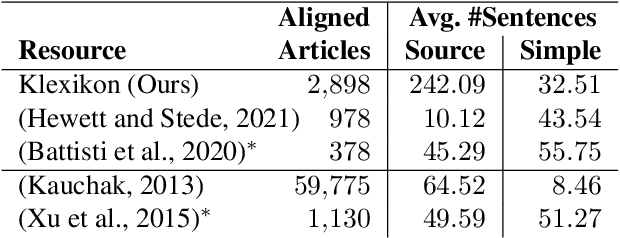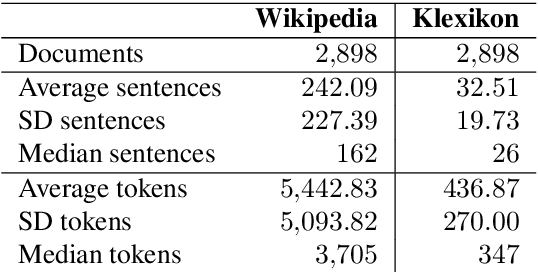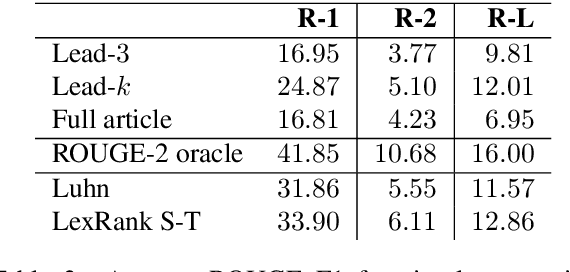Dennis Aumiller
Command A: An Enterprise-Ready Large Language Model
Apr 01, 2025



Abstract:In this report we describe the development of Command A, a powerful large language model purpose-built to excel at real-world enterprise use cases. Command A is an agent-optimised and multilingual-capable model, with support for 23 languages of global business, and a novel hybrid architecture balancing efficiency with top of the range performance. It offers best-in-class Retrieval Augmented Generation (RAG) capabilities with grounding and tool use to automate sophisticated business processes. These abilities are achieved through a decentralised training approach, including self-refinement algorithms and model merging techniques. We also include results for Command R7B which shares capability and architectural similarities to Command A. Weights for both models have been released for research purposes. This technical report details our original training pipeline and presents an extensive evaluation of our models across a suite of enterprise-relevant tasks and public benchmarks, demonstrating excellent performance and efficiency.
TICKing All the Boxes: Generated Checklists Improve LLM Evaluation and Generation
Oct 04, 2024



Abstract:Given the widespread adoption and usage of Large Language Models (LLMs), it is crucial to have flexible and interpretable evaluations of their instruction-following ability. Preference judgments between model outputs have become the de facto evaluation standard, despite distilling complex, multi-faceted preferences into a single ranking. Furthermore, as human annotation is slow and costly, LLMs are increasingly used to make these judgments, at the expense of reliability and interpretability. In this work, we propose TICK (Targeted Instruct-evaluation with ChecKlists), a fully automated, interpretable evaluation protocol that structures evaluations with LLM-generated, instruction-specific checklists. We first show that, given an instruction, LLMs can reliably produce high-quality, tailored evaluation checklists that decompose the instruction into a series of YES/NO questions. Each question asks whether a candidate response meets a specific requirement of the instruction. We demonstrate that using TICK leads to a significant increase (46.4% $\to$ 52.2%) in the frequency of exact agreements between LLM judgements and human preferences, as compared to having an LLM directly score an output. We then show that STICK (Self-TICK) can be used to improve generation quality across multiple benchmarks via self-refinement and Best-of-N selection. STICK self-refinement on LiveBench reasoning tasks leads to an absolute gain of $+$7.8%, whilst Best-of-N selection with STICK attains $+$6.3% absolute improvement on the real-world instruction dataset, WildBench. In light of this, structured, multi-faceted self-improvement is shown to be a promising way to further advance LLM capabilities. Finally, by providing LLM-generated checklists to human evaluators tasked with directly scoring LLM responses to WildBench instructions, we notably increase inter-annotator agreement (0.194 $\to$ 0.256).
On Leakage of Code Generation Evaluation Datasets
Jul 11, 2024



Abstract:In this paper we consider contamination by code generation test sets, in particular in their use in modern large language models. We discuss three possible sources of such contamination and show findings supporting each of them: (i) direct data leakage, (ii) indirect data leakage through the use of synthetic data and (iii) overfitting to evaluation sets during model selection. Key to our findings is a new dataset of 161 prompts with their associated python solutions, dataset which is released at https://huggingface.co/datasets/CohereForAI/lbpp .
How Does Quantization Affect Multilingual LLMs?
Jul 03, 2024Abstract:Quantization techniques are widely used to improve inference speed and deployment of large language models. While a wide body of work examines the impact of quantized LLMs on English tasks, none have examined the effect of quantization across languages. We conduct a thorough analysis of quantized multilingual LLMs, focusing on their performance across languages and at varying scales. We use automatic benchmarks, LLM-as-a-Judge methods, and human evaluation, finding that (1) harmful effects of quantization are apparent in human evaluation, and automatic metrics severely underestimate the detriment: a 1.7% average drop in Japanese across automatic tasks corresponds to a 16.0% drop reported by human evaluators on realistic prompts; (2) languages are disparately affected by quantization, with non-Latin script languages impacted worst; and (3) challenging tasks such as mathematical reasoning degrade fastest. As the ability to serve low-compute models is critical for wide global adoption of NLP technologies, our results urge consideration of multilingual performance as a key evaluation criterion for efficient models.
BLESS: Benchmarking Large Language Models on Sentence Simplification
Oct 24, 2023



Abstract:We present BLESS, a comprehensive performance benchmark of the most recent state-of-the-art large language models (LLMs) on the task of text simplification (TS). We examine how well off-the-shelf LLMs can solve this challenging task, assessing a total of 44 models, differing in size, architecture, pre-training methods, and accessibility, on three test sets from different domains (Wikipedia, news, and medical) under a few-shot setting. Our analysis considers a suite of automatic metrics as well as a large-scale quantitative investigation into the types of common edit operations performed by the different models. Furthermore, we perform a manual qualitative analysis on a subset of model outputs to better gauge the quality of the generated simplifications. Our evaluation indicates that the best LLMs, despite not being trained on TS, perform comparably with state-of-the-art TS baselines. Additionally, we find that certain LLMs demonstrate a greater range and diversity of edit operations. Our performance benchmark will be available as a resource for the development of future TS methods and evaluation metrics.
Evaluating Factual Consistency of Texts with Semantic Role Labeling
May 22, 2023Abstract:Automated evaluation of text generation systems has recently seen increasing attention, particularly checking whether generated text stays truthful to input sources. Existing methods frequently rely on an evaluation using task-specific language models, which in turn allows for little interpretability of generated scores. We introduce SRLScore, a reference-free evaluation metric designed with text summarization in mind. Our approach generates fact tuples constructed from Semantic Role Labels, applied to both input and summary texts. A final factuality score is computed by an adjustable scoring mechanism, which allows for easy adaption of the method across domains. Correlation with human judgments on English summarization datasets shows that SRLScore is competitive with state-of-the-art methods and exhibits stable generalization across datasets without requiring further training or hyperparameter tuning. We experiment with an optional co-reference resolution step, but find that the performance boost is mostly outweighed by the additional compute required. Our metric is available online at https://github.com/heyjing/SRLScore.
On the State of German Text Summarization
Jan 17, 2023Abstract:With recent advancements in the area of Natural Language Processing, the focus is slowly shifting from a purely English-centric view towards more language-specific solutions, including German. Especially practical for businesses to analyze their growing amount of textual data are text summarization systems, which transform long input documents into compressed and more digestible summary texts. In this work, we assess the particular landscape of German abstractive text summarization and investigate the reasons why practically useful solutions for abstractive text summarization are still absent in industry. Our focus is two-fold, analyzing a) training resources, and b) publicly available summarization systems. We are able to show that popular existing datasets exhibit crucial flaws in their assumptions about the original sources, which frequently leads to detrimental effects on system generalization and evaluation biases. We confirm that for the most popular training dataset, MLSUM, over 50% of the training set is unsuitable for abstractive summarization purposes. Furthermore, available systems frequently fail to compare to simple baselines, and ignore more effective and efficient extractive summarization approaches. We attribute poor evaluation quality to a variety of different factors, which are investigated in more detail in this work: A lack of qualitative (and diverse) gold data considered for training, understudied (and untreated) positional biases in some of the existing datasets, and the lack of easily accessible and streamlined pre-processing strategies or analysis tools. We provide a comprehensive assessment of available models on the cleaned datasets, and find that this can lead to a reduction of more than 20 ROUGE-1 points during evaluation. The code for dataset filtering and reproducing results can be found online at https://github.com/dennlinger/summaries
UniHD at TSAR-2022 Shared Task: Is Compute All We Need for Lexical Simplification?
Jan 05, 2023



Abstract:Previous state-of-the-art models for lexical simplification consist of complex pipelines with several components, each of which requires deep technical knowledge and fine-tuned interaction to achieve its full potential. As an alternative, we describe a frustratingly simple pipeline based on prompted GPT-3 responses, beating competing approaches by a wide margin in settings with few training instances. Our best-performing submission to the English language track of the TSAR-2022 shared task consists of an ``ensemble'' of six different prompt templates with varying context levels. As a late-breaking result, we further detail a language transfer technique that allows simplification in languages other than English. Applied to the Spanish and Portuguese subset, we achieve state-of-the-art results with only minor modification to the original prompts. Aside from detailing the implementation and setup, we spend the remainder of this work discussing the particularities of prompting and implications for future work. Code for the experiments is available online at https://github.com/dennlinger/TSAR-2022-Shared-Task
EUR-Lex-Sum: A Multi- and Cross-lingual Dataset for Long-form Summarization in the Legal Domain
Oct 24, 2022



Abstract:Existing summarization datasets come with two main drawbacks: (1) They tend to focus on overly exposed domains, such as news articles or wiki-like texts, and (2) are primarily monolingual, with few multilingual datasets. In this work, we propose a novel dataset, called EUR-Lex-Sum, based on manually curated document summaries of legal acts from the European Union law platform (EUR-Lex). Documents and their respective summaries exist as cross-lingual paragraph-aligned data in several of the 24 official European languages, enabling access to various cross-lingual and lower-resourced summarization setups. We obtain up to 1,500 document/summary pairs per language, including a subset of 375 cross-lingually aligned legal acts with texts available in all 24 languages. In this work, the data acquisition process is detailed and key characteristics of the resource are compared to existing summarization resources. In particular, we illustrate challenging sub-problems and open questions on the dataset that could help the facilitation of future research in the direction of domain-specific cross-lingual summarization. Limited by the extreme length and language diversity of samples, we further conduct experiments with suitable extractive monolingual and cross-lingual baselines for future work. Code for the extraction as well as access to our data and baselines is available online at: https://github.com/achouhan93/eur-lex-sum.
Klexikon: A German Dataset for Joint Summarization and Simplification
Jan 18, 2022



Abstract:Traditionally, Text Simplification is treated as a monolingual translation task where sentences between source texts and their simplified counterparts are aligned for training. However, especially for longer input documents, summarizing the text (or dropping less relevant content altogether) plays an important role in the simplification process, which is currently not reflected in existing datasets. Simultaneously, resources for non-English languages are scarce in general and prohibitive for training new solutions. To tackle this problem, we pose core requirements for a system that can jointly summarize and simplify long source documents. We further describe the creation of a new dataset for joint Text Simplification and Summarization based on German Wikipedia and the German children's lexicon "Klexikon", consisting of almost 2900 documents. We release a document-aligned version that particularly highlights the summarization aspect, and provide statistical evidence that this resource is well suited to simplification as well. Code and data are available on Github: https://github.com/dennlinger/klexikon
 Add to Chrome
Add to Chrome Add to Firefox
Add to Firefox Add to Edge
Add to Edge